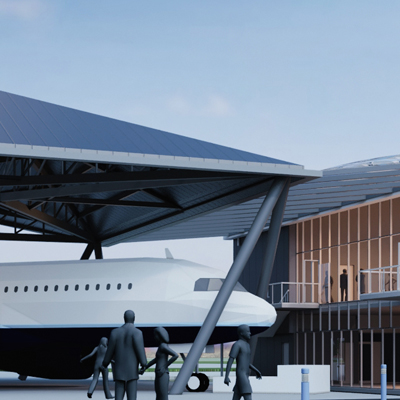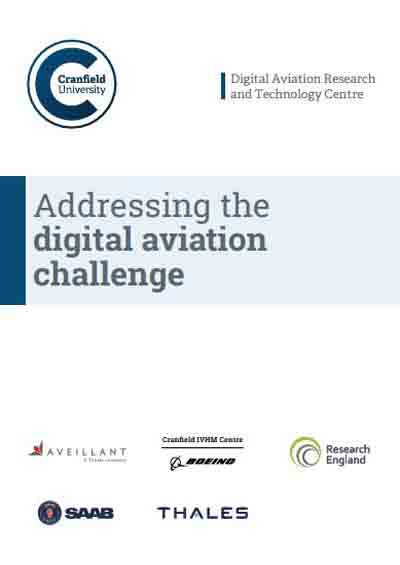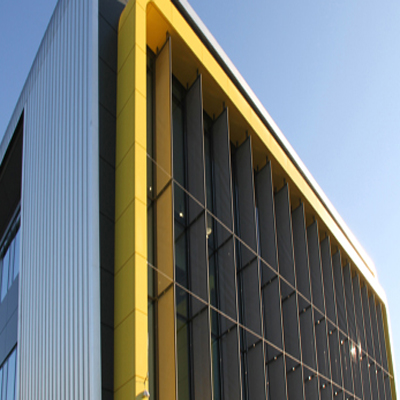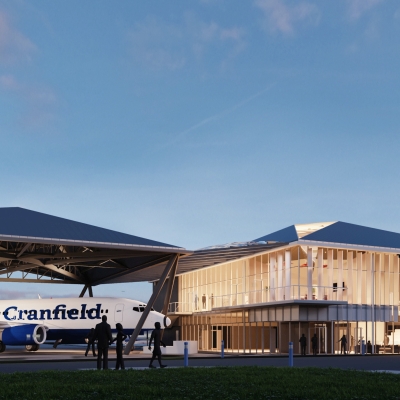
Cranfield University marked the official start of construction of the new £67m Digital Aviation Research and Technology Centre (DARTeC) to be built at the Cranfield campus, with a groundbreaking ceremony on Friday 15 March.
To coincide with British Science Week, the Minister of State for Universities, Science, Research and Innovation, Chris Skidmore MP, was welcomed to the University by Cranfield’s Professor Helen Atkinson. They were joined by guests from leading aviation businesses who are providing co-investment support for DARTeC.
Science and Innovation Minister, Chris Skidmore said: “The UK has a rich heritage in aviation and has always been at the cutting edge of aeronautical research and manufacturing. The future of air travel will be cleaner, greener and more efficient and the new Digital Aviation Research and Technology Centre will ensure the UK remains at the forefront of pioneering the next generation of flight, from new self-sensing technology to electrifying air travel.
“In our Aero Sector Deal we have set out our plans alongside industry to lead the world in electric aviation, boosting UK exports and create the high quality jobs of tomorrow as part of our modern Industrial Strategy.”
Professor Helen Atkinson, Pro-Vice-Chancellor, School of Aerospace, Transport and Manufacturing, said: “DARTeC will be part of Cranfield’s global research airport and provide the opportunity to advance the application of digital technologies in the air transport sector through partnership and collaboration. Digital technology will allow us to deliver greater efficiency and enhanced safety for aircraft and its passengers.”
The Centre will spearhead the UK’s research into digital aviation technology, investigating challenges facing the aviation industry such as:
- the integration of drones into civilian airspace;
- increasing the efficiency of airports through technological advances;
- creating safe, secure shared airspace through secure data communication infrastructures;
- increasing the reliability and availability of aircraft through self-sensing, self-aware technologies.
Funding for DARTeC is being provided through a consortium of leading aerospace and aviation companies including Thales UK, Saab AB, Aveillant, Boxarr, Blue Bear Systems Research, IATA and Transport Systems Catapult – as well as Research England and Cranfield University.
Dr Dominic Walker, CEO of Cambridge-based radar developers Aveillant, said: "Our company is built on technical innovation, and in particular applications of this in the field of aviation. The pan-industry partnerships within the DARTeC consortium give us the ability to address aviation technology challenges Aveillant could not tackle alone."
Andrew Walton, Head of Saab UK, said: “Our commitment to innovation and delivering leading-edge technologies across the civil and military domains sits at the very heart of Saab. We commit 23 percent of our annual turnover towards research and development and our involvement with DARTeC evidences our ongoing work here in the UK.”
Steve Murray, VP Strategy & Marketing for Thales UK, said: “Thales is committed to play a key role in positioning the UK as a global leader in the digitisation of aviation and our role as a major founding consortium partner with Cranfield University is one of the many ways we are doing this. The partnership will enable us to further examine the real-world impact of digital transformation to jointly develop and exploit innovations within and between digitised airline operations, aircraft, airspace management and airports that are already in play today.”
The Centre is scheduled to open in autumn 2020. Research areas will include a covered hangar laboratory with a 737-400 aircraft and next-generation technologies such a Holographic Radar System capable of monitoring and controlling airspace around Cranfield’s own airport.
The University’s digital air traffic control tower, the first in the UK opened in December 2018, creating a unique research and development environment.







